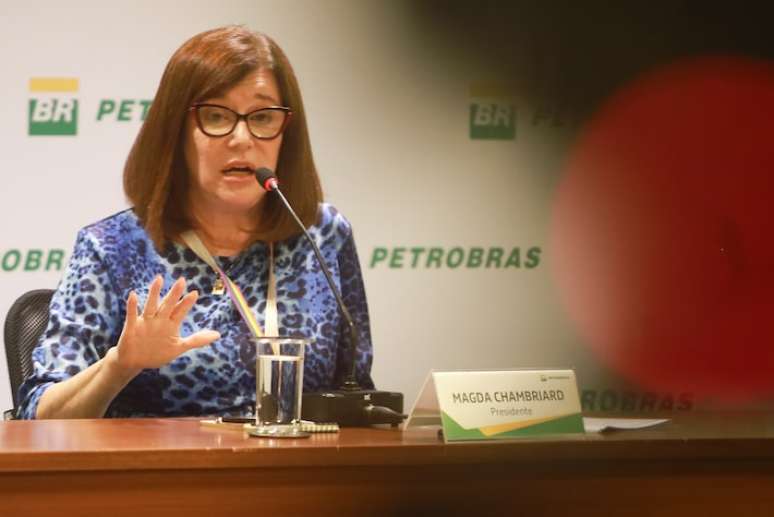The new president of the state company declared that pre-salt oil reserves will decrease starting from 2030; he defended that the Ministry of the Environment be “clarified” on the need to drill wells in the Equatorial Margin
RIO – The president of Petrobras, Magda Chambriard, stated several times, in his first press interview in office this Monday 27th, that his management’s objective will be to accelerate oil exploration activities to replenish the state company’s reserves. He recalled that the company’s oil reserves are still largely based on pre-saltwill decrease from 2030 onwards.
“We have to be very careful about replenishing reserves, unless we want to become importers of oil again, which is out of the question for us. The question of reserves is important, it brings with it the question of new frontiers, including Amapá, on the Equatorial margin and in the Pelotas Basin, the exploration effort of this company must be maintained and accelerated. It is all part of the commercial logic of this company,” he said.
According to her, Petrobras dominates ultra-deepwater oil production and the company’s goal could be nothing other than “ensuring productivity.” “And for this it is essential to replenish reserves,” she said.
“The survival of Petrobras has an important component, which is the timely production of these reservoirs, with maximum utilization, increasing resource potential, but replenishing reserves,” he said.
In addition to these so-called “new frontiers,” Magda said there is room for new discoveries in pre-salt itself, even if it is not as large as past fields, including Tupi, where the company produces larger comes from .
Magda was elected president of Petrobras by the company’s Board of Directors last Friday, the 24th. She was appointed by President Luiz Inácio Lula da Silva to replace Jean Paul Prates with the aim of accelerating the company’s investments.
In his speech he did not rule out the internationalization of exploration, recalling that it is an internationalized enterprise, but stated that the absolute priority is the generation of wealth on the Brazilian coast. Last year, Petrobras announced the return of operations to the west coast of Africa, where it acquired a stake in Shell blocks in São Tomé and Príncipe and is negotiating to enter the Namibian coast.
Ministry of the Environment
When asked about the resistance of the Ministry of Environment (MMA) and Ibama in allowing exploration in the Equatorial Rim, Magda said Marina Silva’s department needs to be made more clear about Petrobras’ urgent need to replenish reserves . “The Ministry of the Environment needs to be more informed about the need for Brazil to explore the Rim (Equatorial) and drill these wells, also to guide the transition,” he said.
The new president of Petrobras also stated that the company’s attention goes well beyond what is required by environmental legislation, which will be evident from the company’s behavior on the matter. He also guaranteed that Petrobras will continue to invest in the diversity of energy sources capable of guaranteeing the company’s future.
Magda recalled that her role will be to strengthen the national supply chain, a topic she has followed for many years, since the days when she worked at the National Agency for Petroleum, Natural Gas and Biofuels (ANP).
“All contracts provide equal opportunities for domestic and foreign suppliers. We will have to respect equal opportunities between domestic and external suppliers,” Magda said.
Fuel prices
Magda indicated that it should not change the current fuel pricing policy of the state-owned company, which observes market realities, such as international prices and preservation of market share, but without considering costs related to imports, which do not affect Petrobras’ operations.
“Petrobras has always operated following the trend of international prices, sometimes higher, sometimes lower. What is highly undesirable? Bringing price instability into Brazilian society every day. Petrobras has always ensured stability,” he said.
He recalled the problem, which is the very high prices of petrol and diesel and that President Lula promised, in a campaign registered with the TSE, to “Brazilianize prices”. “And so it was. Is it right for me to set prices considering the shipping costs for a product that I don’t import? This has already been addressed,” he said, in a tone of compliment for what has already been done.
At the same time, Magda said, Petrobras would have an (unrealized) opportunity cost of exporting that will be factored into final product prices. “This is not an invention, it is a commercial logic. Petrobras, when it approaches the market, takes it into account, and we are taking it into account too,” she says.
Again according to her, the change in pricing policy under Lula led, in one year and five months, to a reduction in the price of petrol of almost 25%, a “Brazilianisation of the price” which was carried out and which its management “will continue to do so”.
“There are times when if I increase the price of fuel too much, I lose market share. So we price a product that follows a business logic in a company that does not want to lose market share. All this is the same basket,” he said. said.
Reacquisition of Mataripe
The repurchase of the Mataripe refinery in Bahia is not ruled out, according to the president of Petrobras, but only if it makes sense for the state company and adds value, she said, when asked if she would be interested in repurchasing the sold asset under the government of Jair Bolsonaro. “If it’s a good deal, why not?” underlined the executive.
According to her, in addition to the refinery purchased by Petrobras, a biorefinery is being studied with the controller of Mataripe, Acelen, “but there is nothing defined”, she informed. “No one can say, at a time when there is so much talk about the energy transition, that we will not consider biorefining. But this is not yet defined,” she said.
Source: Terra
Rose James is a Gossipify movie and series reviewer known for her in-depth analysis and unique perspective on the latest releases. With a background in film studies, she provides engaging and informative reviews, and keeps readers up to date with industry trends and emerging talents.







